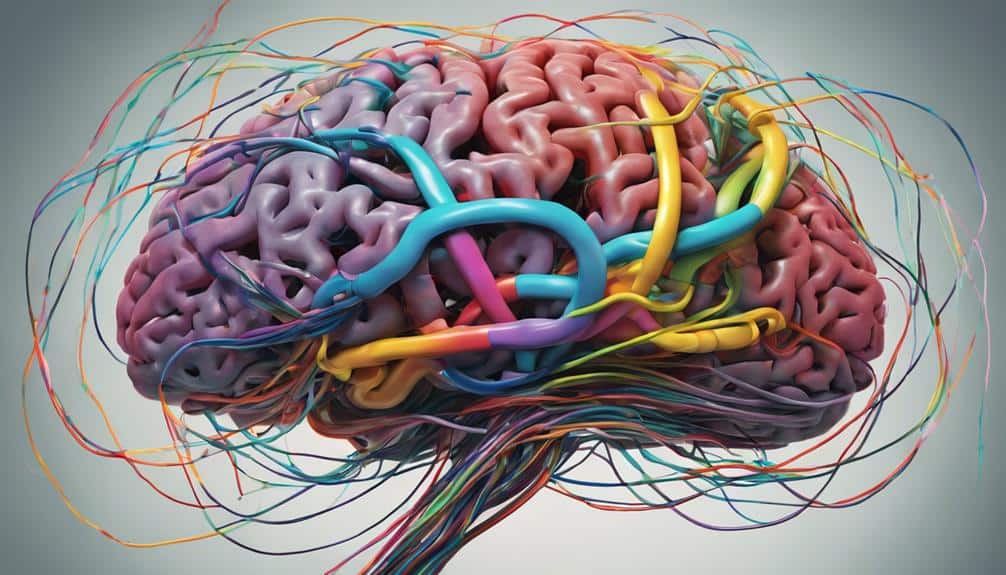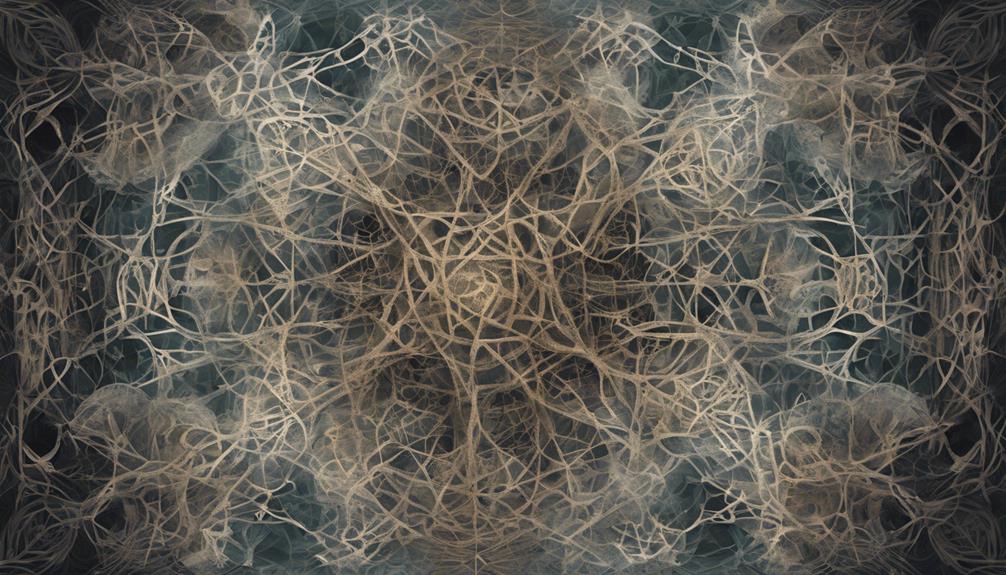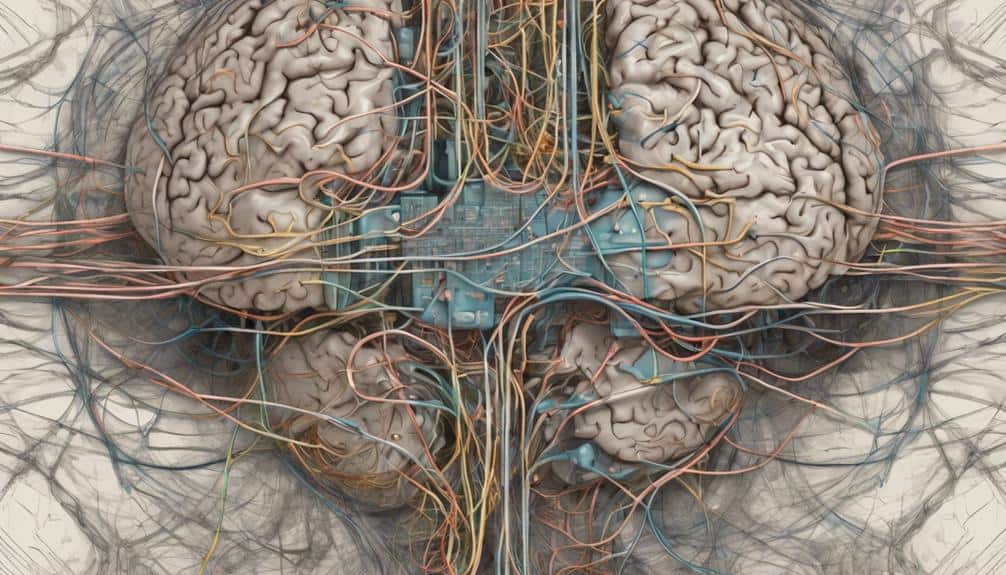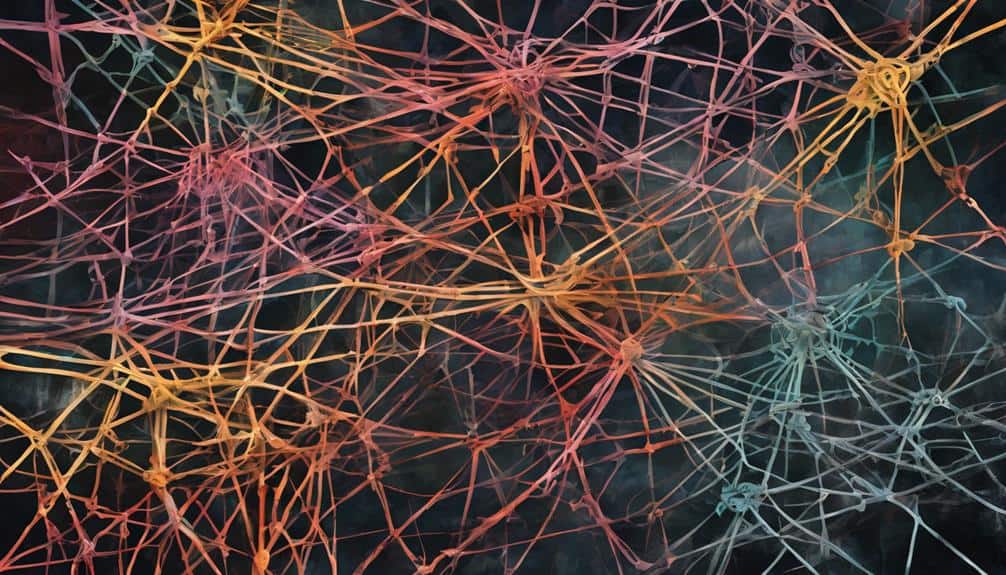Is Ocd Neurodivergent
As I reflect on the intricate web of thoughts that OCD weaves in the mind, I can't help but ponder its place within the domain of neurodiversity.
The interplay between compulsions and obsessions in OCD hints at a deeper connection to neurodivergent traits, sparking a debate on its classification.
Unraveling the complexities of OCD through a neurodivergent lens may shed light on new avenues for understanding and support.
Join me as we explore the nuances of this discussion and navigate the implications it holds for individuals living with OCD.
Key Takeaways
- OCD is positioned within neurodiversity, reflecting diverse brain functioning.
- Neurodiversity encompasses OCD, acknowledging its impact on mental health.
- Understanding neurodiversity in OCD promotes inclusive and empathetic approaches.
- Unique cognitive patterns in OCD align with neurodivergent traits, shaping tailored interventions.
Neurodiversity and OCD

When considering the relationship between neurodiversity and OCD, it becomes evident that OCD is often positioned within the neurodivergent spectrum due to its significant impact on brain functioning and behavior. Neurodiversity encompasses the variations in how our brains work, including mental conditions like OCD. Individuals with OCD may face challenges related to neurodivergence, impacting how they perceive and interact with the world.
Understanding this intersection is essential in providing tailored support and accommodations for individuals with OCD. By recognizing OCD as part of the neurodivergent spectrum, we can promote a more inclusive approach to mental health and foster a deeper understanding of the unique needs of those with OCD. Embracing neurodiversity not only helps in reducing stigma but also enhances empathy towards individuals with OCD, creating a more supportive environment for their well-being.
This perspective highlights the importance of acknowledging the diverse ways in which neurodivergence manifests in individuals with OCD.
Understanding OCD Symptoms

Positioned within the neurodivergent spectrum due to its impact on brain functioning and behavior, OCD symptoms are characterized by intrusive thoughts that instigate distress and anxiety. Obsessions in OCD are persistent and unwanted thoughts, images, or urges that cause significant anxiety and distress.
These obsessions often lead to the development of compulsions, which are repetitive behaviors or mental acts performed to reduce the anxiety associated with the obsessions. Compulsions in OCD can manifest in various forms such as checking, counting, or engaging in specific rituals like cleaning. Individuals with OCD may find themselves spending a considerable amount of time each day performing these rituals to alleviate their anxiety.
Consequently, OCD symptoms can have a profound impact on daily functioning and quality of life, affecting relationships, work, and overall well-being. Understanding these key aspects of OCD symptoms is vital in recognizing the challenges faced by individuals with this neurodivergent condition.
Neurodivergent Traits in OCD

Neurodivergent traits in OCD encompass unique cognitive patterns that influence behavior.
Altered neural connectivity and serotonin levels are key characteristics that set OCD apart as a neurodivergent condition.
Understanding these distinct traits is essential for developing effective interventions tailored to individuals with OCD.
Neurodiversity in OCD
In exploring neurodiversity within Obsessive-Compulsive Disorder (OCD), the intricate neurological traits and behaviors associated with the condition come to light. Individuals with OCD often display neurodivergent characteristics that can impact their daily functioning and overall mental health experiences.
Understanding the neurodiversity in OCD is vital for developing tailored treatment approaches that cater to the diverse neurological profiles of those affected. Embracing the neurodivergent traits in OCD sheds light on the importance of recognizing the varied ways in which this condition manifests in individuals.
This inclusive approach can lead to more effective interventions and support systems for individuals maneuvering the complexities of OCD.
Unique Cognitive Patterns
Exploring the cognitive intricacies of Obsessive-Compulsive Disorder (OCD) reveals unique patterns and traits that align with neurodivergent characteristics. Individuals with OCD often display specific cognitive patterns that reflect neurodivergent traits, such as heightened sensitivity to stimuli and rigid thought processes.
The manifestation of intrusive thoughts and compulsions in OCD further underscores the connection to neurodivergent characteristics. These distinct cognitive patterns suggest that there are underlying brain processing differences in individuals with OCD, contributing to their neurodivergent traits.
Recognizing these unique characteristics can lead to more tailored and effective treatment strategies for individuals with OCD, emphasizing the importance of understanding the neurodivergent traits within the condition for improved therapeutic outcomes.
Impact on Behavior
The behavioral manifestations of Obsessive-Compulsive Disorder (OCD) often reveal distinct patterns indicative of unique cognitive traits associated with neurodivergence. Individuals with OCD may exhibit repetitive behaviors and intrusive thoughts, which are common neurodivergent traits.
These behaviors, such as compulsions and rituals, can be influenced by the neurodivergent nature of OCD, leading to atypical behaviors and thought processes. Understanding these unique patterns and neurodivergent traits in OCD is essential for developing tailored treatment approaches that address the specific needs of individuals with this condition.
Overlapping OCD With Neurodivergence

Amidst the intricate landscape of neurodivergent conditions, the intertwining relationship between Obsessive-Compulsive Disorder (OCD) and other neurodivergences like Autism and ADHD reveals a complex intersection worth exploring.
OCD is commonly recognized as neurodivergent due to its impact on brain functioning and behavior. Research indicates a potential overlap between OCD and conditions such as Autism and ADHD, suggesting shared underlying mechanisms or co-occurrence. Understanding the neurodivergent aspects of OCD is vital as it can influence treatment approaches and strategies for managing symptoms effectively.
Tailored interventions that acknowledge the intersection of OCD with Autism and ADHD can lead to more personalized and supportive care. Recognizing OCD within the neurodivergent spectrum not only enhances treatment outcomes but also contributes to destigmatizing the condition and fostering inclusivity within neurodiversity discussions.
OCD and Co-Occurrence With Neurodivergent Conditions

In neurodivergent contexts, the co-occurrence of Obsessive-Compulsive Disorder (OCD) with conditions like ADHD and Autism is a notable phenomenon. This overlap sheds light on the intricate connections between these neurodivergent conditions.
Some key points to keep in mind are:
- Shared Genetic Factors: Research indicates that genetic factors play a role in the co-occurrence of OCD with ADHD and Autism, suggesting a common underlying genetic predisposition in some cases.
- Neurobiological Factors: Neurobiological mechanisms also contribute to the overlap between OCD, ADHD, and Autism, influencing brain functions and behaviors associated with these conditions.
- Impact on Cognitive Control and Social Interactions: The presence of OCD symptoms alongside ADHD and Autism can exacerbate challenges related to cognitive control, focus, attention, and social interactions, underscoring the complexity of managing these co-occurring conditions.
Understanding the interplay between these conditions is important for developing thorough approaches to support neurodivergent individuals facing multiple challenges simultaneously.
Tailored Therapy for OCD and Neurodivergence

Tailored therapy for OCD and neurodivergence involves crafting personalized treatment plans that cater to individual needs. By understanding the unique challenges and symptoms experienced by neurodivergent individuals with OCD, therapy can be tailored to address these specific aspects effectively.
Specialized interventions within this framework aim to enhance the quality of life and well-being of those at the intersection of OCD and neurodivergence.
Personalized Treatment Approaches
Utilizing personalized treatment approaches for individuals with OCD and neurodivergence involves tailoring therapeutic strategies to address their unique symptoms and challenges. Personalized interventions cater to the specific needs of neurodivergent people undergoing OCD treatment. This individualized approach considers sensory processing issues and cognitive differences that may impact treatment effectiveness. Customized strategies are designed to break compulsive cycles and effectively manage anxiety in neurodivergent individuals with OCD.
- Tailored therapy accounts for unique symptoms and challenges.
- Individualized treatment plans address specific needs of neurodivergent individuals with OCD.
- Therapeutic approaches adjust for sensory processing issues and cognitive differences.
Understanding Unique Needs
Understanding the unique needs of individuals with OCD and neurodivergence involves tailoring therapy to address their specific symptoms and challenges. By customizing treatment strategies, we can better support neurodivergent individuals with OCD, enhancing their quality of life.
Therapy designed for neurodivergent individuals acknowledges the diverse ways OCD can manifest within this population and considers the intersectionality of various neurodivergent conditions. Tailored therapy for OCD in a neurodivergent context aims to optimize outcomes and well-being by recognizing the individuality of each person's experience.
Supporting Neurodiverse Individuals With OCD

Supporting neurodiverse individuals with OCD involves recognizing the unique brain processing patterns that characterize this condition. When providing assistance for individuals with OCD within the neurodiversity framework, it's essential to take into account:
- Tailored Accommodations: Offering accommodations that cater to the specific needs and challenges of each individual with OCD can greatly enhance their well-being and success in managing their symptoms.
- Understanding Executive Functioning Challenges: Acknowledging the difficulties individuals with OCD may face in areas such as decision-making, organization, and cognitive flexibility can aid in developing effective support strategies.
- Utilizing Exposure and Response Prevention (ERP): Implementing evidence-based therapies like ERP, which involve gradually exposing individuals to their obsessions and preventing compulsive responses, can be particularly beneficial in helping neurodiverse individuals with OCD navigate their condition.
Frequently Asked Questions
Is OCD a Mental Illness or Neurodivergent?
OCD is classified as a mental illness due to its impact on mental health. It involves compulsive behaviors and cognitive differences. Stigma surrounding OCD often overlooks its neurodevelopmental traits and brain differences. Treatment for OCD addresses its neurological conditions.
What Conditions Count as Neurodivergent?
Exploring neurodivergent traits involves understanding various neurodevelopmental disorders, mental health, cognitive differences, social stigma, brain diversity, emotional regulation, sensory processing, and neurological conditions. It's essential to recognize and embrace neurological diversity for inclusive support.
Is OCD on the Autism Spectrum?
OCD is not on the Autism Spectrum, but individuals with both conditions can have overlapping symptoms. While distinct, they can co-occur. Research shows higher OCD prevalence in Autism. Tailored support is important for those facing both challenges.
Why Is Living With OCD so Hard?
Living with OCD is challenging due to the constant battle with intrusive thoughts and the need for coping strategies. Daily challenges, social stigma, and therapy options play a role in the struggle, but seeking help and practicing self-care are essential for managing.
Conclusion
To summarize, OCD is indeed a form of neurodivergence, characterized by unique brain processing and altered connectivity.
The intertwining of obsessions and compulsions in OCD can disrupt daily life, highlighting the importance of tailored therapy and interventions.
Just as neurodivergent conditions vary in presentation and impact, so too does OCD.
Embracing this diversity and providing support that aligns with individual needs is essential for empowering neurodiverse individuals to navigate their OCD journey with resilience and understanding.







